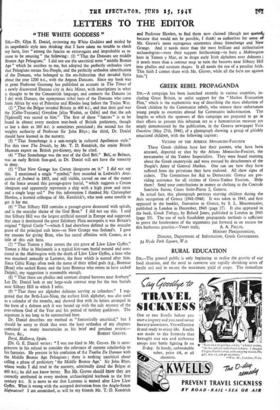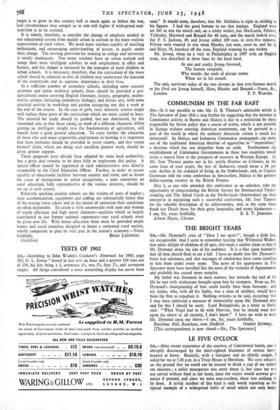RURAL EDUCATION
SIR,—The general public is only beginning to realise the gravity of our food situation, and the need to conserve our rapidly shrinking acres of fertile soil and to secure the maximum yield of crops. The immediate
target is to grow in this country half at much again as before the war, and circumstances may compel us to aim still higher if widespread mal- nutrition is to be avoided.
It is timely, therefore, to consider the change of emphasis needed in our educational system from mainly urban in outlook to the more realistic appreciation of rural values. We need more teachers capable of instilling bithusiasm; and encouraging understanding of nature, in pupils under their charge. The existing provision for training in college and university is totally inadequate. Too many teachers have an urban outlook and tempt their more intelligent scholars to seek employment in office and factory, and this danger is increased by the transport of rural children to urban schools. It is necessary, therefore, that the curriculum of the town school should be adjusted so that all children may understand the function of the countryside and its supreme importance in their lives.
In a sufficient number of secondary schools, including some country grammar and junior technical schools, there should be provided a pre- agricultural course covering English literature, history, geography, mathe- matics, science (including elementary biology), and leisure arts, with some practical activity in workshop and garden occupying one day a week at the end of the course. In the case of girls, rural domestic science might well replace those parts of the curriculum which are more suited to boys. The material for study should be guided, but not dominated, by the vocational aim, so that those taking up work of a different character, whilst gaining an intelligent insight into the fundamentals of agriculture, will benefit from a good general education. To carry further the education of those who seek more responsible employment in farming it is important that farm institutes should be provided in every county, and that young farmers' clubs, which are doing such excellent pioneer work, should be given greater support.
These proposals have already been adopted by some local authorities, but a great deal remains to be done fully to implement this policy. A special officer should be appointed in each administrative area directly responsible to the Chief Education Officer. Further, in order to secure equality of educational facilities between country and town, and so lessen the cause of immigration to urban occupations, a joint committee on rural education, fully representative of the various interests, should be set up in each county.
Relatively speaking country schools are the victims of years of neglect ; their accommodation, equipment and staffing are substantially below that of the average town school and in the matter of sanitation their conditions are often deplorable. To create a virile countryside with men and women of sturdy physique and high moral character—qualities which so largely contributed to our former national supremacy—our rural schools must be given new life. With better education there must be provided ample homes and social amenities designed to foster a contented rural society, wholly competent to play its vital part in the nation's economy.—Yours Guildford.































 Previous page
Previous page